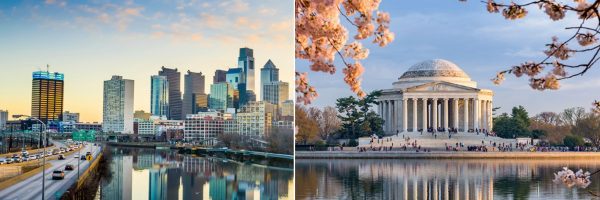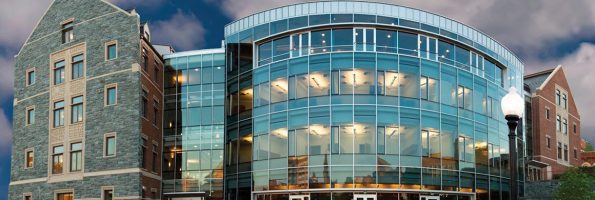How Affordable are Baltimore MBA Programs Compared to DC?

A few years ago, the Baltimore Sun published a hilarious list outlining 100 reasons why Baltimore is a better city than Washington DC. Here are some of our favorite reasons:
- We don’t start conversations by asking, “What do you do?” or “Who do you work for.”
- It never takes us 45 minutes to go six miles.
- Our traffic doesn’t lead to clinical depression.
- D.C.’s happy hour is regular price to us.
- Our signature food is crab cakes and pit beef. D.C. has … yeah.
- We weren’t built on a swamp.
- Cal Ripken is 2,632 times better than any D.C. sports figure.
- The NATIONAL Aquarium: Not in the nation’s capital.
Yes, some of these reasons are very tongue-in-cheek, and the list aimed to be light-hearted and irreverent. But if you’re a prospective MBA in the DMV, there are some clear advantages to picking a business school in the Baltimore metro over the Washington DC metro, namely the affordability of programs.
Let’s take a deeper dive and see just how affordable Baltimore MBA Programs are compared to their DC counterparts.
Which MBAs Can You Earn in Baltimore and DC?
Both Baltimore and Washington DC are home to some of the country’s most prestigious business schools and MBA programs. Programs offered in the Baltimore metro include:
- Perdue School of Business – Salisbury University
- Carey Business School – Johns Hopkins University
- Sellinger School of Business – Loyola University Maryland
- University of Baltimore – Merrick School of Business
- University of Maryland R.H. Smith School of Business
Meanwhile, MBA programs offered in the Washington DC Metro include:
- George Mason University School of Business
- George Washington University School of Business
- Howard University School of Business
- Kogod School of Business – American University
- McDonough School of Business – Georgetown University
How Affordable are Baltimore’s Programs Compared to DC’s?
Yes, both metros boast and impressive programs that are sure to provide prospective MBAs with a high-quality business educations, but which city offers the more affordable options?
Here is the average cost per credit hour at business schools in Baltimore.
- Carey Business School Global MBA: $2,174 per credit hour
- Perdue School of Business Full-Time MBA: $392 per credit hour (in-state students), $703 per credit hour (out-of-state students)
- Sellinger School of Business Full-Time MBA: $1,238 per credit hour
- Merrick School of Business Flexible MBA: $824 per credit hour (in-state students), $1,149 per credit (out-of-state students)
- R.H. Smith School of Business Full-Time MBA: $1,658 per credit hour (in-state students), $1,998 per credit (out-of-state students)
Let’s compare these tuitions rates to the MBA offerings in the Washington DC area:
- George Mason University School of Business Full-Time MBA: $950 per credit hour (residents of Virginia, Maryland, and Washington DC), $1,751.50 per credit hour (out-of-state and international students)
- George Washington University School of Business Global MBA: $1,837 per credit hour
- Howard University School of Business Full-Time MBA: $1,259 per credit hour
- Kogod School of Business Full-Time MBA: $1,642 per credit hour
- McDonough School of Business Full-Time MBA: $1,880 per credit hour
When looking at tuition costs, Baltimore takes the cake. Even though Baltimore boasts the most expensive full-time program (Carey Business School Global MBA), the average cost per credit hour for both in-state and out-of-state students is about 16 percent lower in Charm City.
Washington DC vs. Baltimore MBA Cost
| Baltimore | Washington DC | |
|---|---|---|
| In-State Cost (per credit hour) | $1,257.20 | $1,513.60 |
| Out-of-State Cost (per credit hour) | $1,452.40 | $1,673.90 |
Additional Costs To Consider
Aside from tuition, business students living in the Baltimore area have a lower cost of living then their Washington DC counterparts. According to Numbeo, you would need around $4,541 in Baltimore to maintain the same standard of life that you can have with $6,100 in Washington DC, assuming you rent in both cities. This calculation uses the website’s Cost of Living Plus Rent Index to compare cost of living.
Here’s a closer look at how Numbeo creates its Cost of Living Indexes, and a breakdown of a few key stats to look at when comparing Baltimore to Washington DC:
- Consumer Prices in Baltimore, MD are 14.78 percent lower than in Washington DC
- Rent Prices in Baltimore, MD are 39.97 percent lower than in Washington DC
- Groceries Prices in Baltimore, MD are 15.70 percent lower than in Washington DC
- Local Purchasing Power in Baltimore, MD is 10.21 percent lower than in Washington DC
The case for Washington DC
So Baltimore’s MBA offerings are, on average, more affordable than Washington DCs. But what if money isn’t an issue, or you happen to get into a program in DC? Here are a few ways that the Capital City has the Monument CIty beat, according to Thrillist:
- Culinary Scene: DC is experience a craft beer renaissance with four breweries opening in recent years: DC Brau, 3 Stars Brewing, Chocolate City, and Bluejacket (soon). Meanwhile, notable restaurants such as minibar (Andres), Le Diplomate (Starr), Kapnos (Isabella), Range (Voltaggio), and Casa Luca (Trabocchi) have also opened. Baltimore isn’t really known as much of a foodie town.
- Public Transit: The Metro is one of the most efficient, most convenient, and cleanest public rail lines in the country. Baltimore’s metro runs East to West only, and doesn’t link up with either of the two other rail systems.
Oh, and remember that Baltimore Sun article we reference at the top of the page? Enjoy DC Inno’s slightly more punchy response.
How Fast Can You Earn an MBA?

The process of earning an MBA is an exciting and often transformational time in someone’s life—and for some people, the faster you can get through it, the better.
The benefits of earning an MBA, such as increased post-graduate salary, career advancement potentials, and development of a strong business network, remain true regardless of how long it takes to complete your degree program. Completing your degree quickly just means reaping the benefits faster, while limiting the amount of time without an income.
MBA graduates are a diverse group—not only are they rising business leaders, but they are also parents, community organizers, and working professionals. With so many different types of MBA programs available, such as Online or Accelerated MBAs, students can choose the best program for their busy life and time constraints.
The average time it takes to complete your MBA can vary depending on the school, program, and type of degree. Below, we’ve rounded up the most important information regarding the average program length and schedule for a variety of MBA programs throughout and beyond the United States.
How Fast You Can Earn a Full-Time MBA?
With so many options to truncate the amount of time it takes to complete an MBA, it may seem strange that someone would still choose to pursue a full-time degree. Nevertheless, there are still numerous benefits to pursuing your MBA full time. Among these benefits is the increased opportunity for full-time students to get fully involved in the goings on of their university and business school. From student organizations to case competitions to hands-on experiences, full-time students have committed their full schedule to their business education and most certainly reap the benefits when it comes to skills and network development. Furthermore, taking time off of work to pursue your degree full-time leaves you open for more opportunities- such as traveling for study abroad, business plan competitions or corporate visits- that likely wouldn’t be possible for someone working while they’re in school.
The average full-time MBA degree today typically require around 30-60 credit hours, with variation depending on the program. With the typical course load asking students to take three courses (nine credits) per semester, the average full-time MBA can be expected to be completed in two full years. Most full-time programs begin in August or September and take four semesters for students to complete their required work, earning their degree by May or June of the second year.
Since the number of credits required by a particular program can vary, some full-time MBAs may be able to be completed faster than two years. Whereas programs like the full-time MBA at NYU’s Stern School of Business takes two years and requires 60 credits, a program like the full-time MBA at McMaster University’s DeGroote School of Business can be completed in as few as 16 months.
How Fast You Can Earn a Part-Time MBA?
A part-time MBA is the perfect option for someone who doesn’t want to put their career on hold while they earn a degree. With a flexible and often self-paced schedule, students are able to complete their degree in a time frame that works best for them, with classes typically offered at night or on the weekends.
While the benefits of a flexible schedule are enormous, one downside is that taking less courses each semester will ultimately extend the amount of time it takes to complete your degree. Typically, students pursuing their MBA part-time will earn their degree in three years, but this can vary significantly—not just depending on the program, but the person! For example, the top part-time MBA program at Northwestern University’s Kellogg School of Management can take anywhere from 1.25 to five years to complete.
What About an Accelerated MBA?
It’s right there in the name—the Accelerated MBA is all about earning a quality business education quickly and jumping right back into work. Most accelerated MBA programs can be completed in just twelve months if pursued full-time, or twenty-four months on a part-time schedule.
Of course, completing a degree in this length of time takes an impressive commitment. Unlike other programs that have winter and summer breaks between the semesters, many Accelerated MBA programs have shortened vacation periods and will require students to continue working throughout the summer.
Not every school offers a One Year or Accelerated MBA options, but those that do take these programs seriously and ensure that the same quality education received in a full-time degree program can be provided to students in just one year. Programs like the One Year MBA at Emory University’s Goizueta Business School boast impressive statistics, such as a 5:1 student to faculty ratio and a 93 percent success rate for graduates receiving employment within three months of completing their degree.
Is An Online MBA a Faster Option?
The world of Online MBAs is a diverse one with a wide array of options to choose from. Really, the only commonality between all online programs is where the classes take place—online! These programs provide for maximum flexibility where students can pursue their education from the comfort of their own homes—or wherever the world may take them.
Online MBAs come in all shapes and sizes, but typically require an average of around 30 credit hours. Depending on the university schedule, this can take up to two years to complete. At Temple University’s Fox School of Business, for example, the Online MBA program can be completed in 20 months, and includes a one week long opening residency. Some schools may also offer their part-time or Accelerated MBA programs in an online format. At the Kogod School of Business at American University, their AACSB-accredited online MBA involves 48 total credits but can be completed in just one year.
What About an Executive MBA?
The Executive MBA is a program designed for professionals with several years of work experience under the belt, who are looking for an MBA education to enrich their professional experience and open new career opportunities. Since this degree is targeted towards working professionals, it is typically structured so that students can keep working full-time, taking classes in the evenings and weekends.
On average, Executive MBA programs will take up to two years to complete, though this is typically a very part-time schedule. One of the top ranked EMBA programs in the country is the Executive MBA at Fordham University Gabelli School of Business, which can be completed in 22 months by attending class for one three-day weekend per month.
From your first day of classes to graduation, a world-class business education is typically no more than two years away. However, the flexibility of many programs put the power in the student’s hands: important factors like your schedule, finances, and the impact of taking time off of work should all factor into your decision about what type of MBA to pursue.
Georgetown Jumps in Newest Financial Times Global MBA Ranking

Georgetown was one of the bigger winners after the Financial Times unveiled their newest Global MBA Rankings, with the McDonough School of Business earning 16th place in the U.S. and 30th in the world, up from 18th and 40th last year.
To create their rankings, FT evaluated each qualifying MBA program across a wide range of criteria. Much of the data is gathered from alumni and university surveys. According to McDonough, this year’s survey was completed by the class of 2014, which was the first cohort to complete the new school’s new MBA curriculum.
“As a school that prides itself on innovation and excellence, we are pleased to continue climbing in the Financial Times MBA ranking,” said Prashant Malaviya, senior associate dean for MBA programs. “At McDonough, we prepare our students to be principled, global-ready leaders, and we are happy to be recognized by a ranking that values international experiences, career success, and faculty scholarship.”
In addition to alumni data, FT takes the international character and diversity of the school into account for their list. McDonough’s 42-place jump in the International Experience Rank (4th in the U.S.) contributed to high marks in those criteria, as did the required Global Business Experience consulting project and the growing number of international career treks. The school’s faculty research rank is now 19th in the world, up 10 places from last year.
The Financial Times publishes seven rankings annually, relating to MBA, EMBA, Master in Finance, Master in Management programs and Online MBA programs, as well as non-degree executive education courses. They also issue a separate ranking of top European Business Schools. Check out FT’s interactive rankings tables to search for a school of interest, sort by selected criteria and filter by location.
Read more about this year’s FT rankings in our recent spotlight, courtesy of Clear Admit.
Georgetown Entrepreneurship Initiative Names Leonsis Prize Finalists

Georgetown’s top student entrepreneurs are ready to show their stuff and win the cherished Leonsis Prize. The Georgetown Entrepreneurship Initiative at the Georgetown University McDonough School of Business recently announced the 2018 finalists for the Leonsis Family Entrepreneurship Prize.
Finalists will compete at the inaugural Leonsis Family Entrepreneurship Prize “Bark Tank” pitch competition event, according to the school. The Leonsis Family Entrepreneurship Prize is supported by—you guessed it—the Leonis family.
Meet the Leonisis’
Ted Leonsis is a longtime entrepreneur, investor, and founder of Monumental Sports & Entertainment, which owns and operates three professional sports teams: the NBA’s Washington Wizards, NHL’s Washington Capitals and WNBA’s Washington Mystics. Ted’s son, Zach (MBA ’15) is the senior vice president of strategic initiatives of Monumental Sports & Entertainment and general manager of Monumental Sports Network. Ted’s wife, Lynn, and daughter, Elle, the digital marketing director of SnagFilms, Inc., are also involved in the program
Meet the Finalists
Competing teams are made of current Georgetown undergraduate and graduate students, as well as alumni who within six months of graduation. Finalists were selected following a rigorous nomination, application, and review process. They compete for a slice of a $100,000 prize during the Bark Tank pitch competition, where each team share their ventures with a panel of judges, and the McDonough community.
Some of the ventures where founded by McDonough MBAs. Those finalists include:
- Edible Finance: Sunny Gupta (MBA’19) and Chris Johnson (MBA’19). Edible Finance is an Instagram-like stories platform for investments. It provides bite-sized investment tidbits via stories and videos that drive revenue generating investment actions.
- Foublie: Melissa Antal (MBA’19). Foublie is an on-demand service that connects parents with questions about nutrition, food and feeding to specialists and catered resources.
- Galapagos Strategies: Ramya Possett (MBA’17). Galapagos Strategies disrupts the IP model with upfront market analyses, innovative consulting workshops, and the creation of strategic IP that generates value.
- Hatch: JP Coakley (MBA’18) and Kelsey Lents (MBA’18). Hatch is a flexible coworking and licensed child care solution for parents in the gig economy that aligns professional and parental needs.
Visit the Georgetown McDonough website to read about the rest of the finalists. You can learn more about the Leonsis Family Entrepreneurship Prize here.
Choosing the Best MBA: Philadelphia vs. Washington DC

On the surface, cities like Philadelphia and Washington DC appear to have a lot in common. Both have occupied roles as a center of U.S. history, and have transformed into exciting and ever-changing metros for both established businesses and new startups. If you’re interested in earning an MBA in a top metro area on the East Coast, it might seem impossible to choose between the two.
Even so, Philadelphia and DC offer a number of exciting—but different—kinds of opportunities for up-and-coming business professionals. Between what program you want to pursue and what kind of career you envision yourself in down the line, understanding the differences between top metros can be a crucial part of planning your future. Below, we’ll break down some of the biggest differences in location, programs, and job placement for each metro.
Philadelphia vs. Washington DC: The Differences
For ambitious business students hoping to put their education to work in a government agency, it’ll be hard to beat the nation’s capital for opportunities and experience. Even for those looking outside of the government setting, the DC metro area is home to fifteen companies on the Fortune 500 list, including corporate giants like Exxon Mobile and Walmart. Yet while such heavy hitting companies in the area provide a high earning potential, MBAs will still want to consider the high price of living in DC: currently, the city ranks as the third most expensive place to live in the country.
Check This Out: Searching for the World’s Top MBA Recruiters: Comcast
While Philadelphia may not be the city that pops into your mind as a bustling center of business, research shows the City of Brotherly Love can’t be beat when considering the job market and affordability: a 2016 survey from Adobo found that Philadelphia’s unemployment rate was 20 basis points below the national average, while the average price of a home was at or below 30 percent of the average income. MBA graduates will find no shortage of business opportunities in the city, even among major firms: in 2017, 20 companies in the Philadelphia metro made the Fortune 500 list.
Washington DC’s Full-Time MBA Programs
Featuring more than 35 higher education institutions with post-bachelor business programs, Washington DC is home to some of the top MBA programs in the United States. Fully aware that many of these programs will shape future politicians and government leaders, many of the MBA programs in Washington DC include a focus on integrity and ethics within the global business community.
Full-Time MBA Programs in DC Include:
- George Mason University School of Business
- George Washington University School of Business
- Kogod School of Business – American University
- University of Maryland R.H. Smith School of Business
- McDonough School of Business – Georgetown University
Philadelphia’s Full-Time MBA Programs
When it comes to business schools, Philadelphia is probably best known for The Wharton School at the University of Pennsylvania, consistently named as one of the top business programs in the world. But Philly is also home to a wide range of programs with a variety of specializations. Programs like the full-time MBA at Temple University’s Fox School of Business also offer students to take their education beyond Philadelphia, with international campuses based in Italy, London, and Japan.
Full-Time MBA Programs in Philadelphia Include:
- La Salle University
- LeBow College of Business – Drexel University
- Villanova School of Business
- West Chester University
Cost of MBA Programs
Just as important a factor as cost of living, average cost for an MBA program is an important consideration when choosing where to earn your degree. As expected, top programs in both Philadelphia and Washington DC can come with a high price tag. The average cost estimate for one year at Wharton is $105,265, while tuition at DC’s Georgetown McDonough School of Business is $90,591. The average for each city, however, remains much for affordable: approximately $82,090 for programs in Washington DC, and slightly lower in Philadelphia—schools like West Chester even offer an MBA as low as $21,000 per year.
Job Placement and Salary
With so many incredible companies located in both Washington DC and Philadelphia, MBAs have the chance to earn top salaries that can go a long way in both cities. Depending on the position, MBAs in Philadelphia can make anywhere from $64,665 per year (as a financial analyst) to $104,186 per year (as a senior product manager). In Washington DC, the average salary for an MBA graduate is in the $80,000 range, with employees reporting yearly salaries of $74,758 (operations manager) up to $111,983 (marketing director).
NBMBAA Announces Georegtown McDonough Partnership

Georgetown University’s McDonough School of Business has announced a new partnership with the National Black MBA Association (NBMBAA) as part of the first installment of the NBMBAA Collegiate Partnership Program. According to a press release, the program aims to increase awareness and facilitate access to graduate and business education programs in professional fields across the country. Continue reading…
